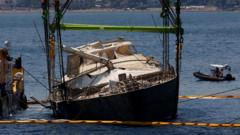Will Stroke Unit Closures Put Lives at Risk?

Concerns Over Proposed Closure of Stroke Units in West Wales Hospitals
The potential closure of stroke units at Bronglais Hospital in Aberystwyth and Glangwili Hospital in Carmarthen has stirred significant unrest among local residents and healthcare advocates in West Wales. Many express concern about the implications of transferring patients between facilities in this vast, rural area. The Hywel Dda Health Board has proposed a shift to a "treat and transfer" model, which would centralize specialist care in Llanelli and Haverfordwest. This article delves into the ongoing debate, unveiling the complexities surrounding this healthcare decision and its potential impact on the local community.
The Proposed Changes: What’s at Stake?
Hywel Dda Health Board has framed the proposed closure of the stroke units as a necessary response to current service fragility and the need to meet specific healthcare standards. The proposed plan aims to consolidate stroke care, purportedly to optimize patient outcomes. However, many stakeholders question whether this approach will truly benefit residents, particularly in light of the unique challenges posed by the region's geography.
Community Reactions and Opposition
The Protect Bronglais Service group recently organized a meeting that drew over 400 attendees, including local politicians from various parties and concerned residents from across multiple counties, such as Ceredigion, Gwynedd, and Powys. This strong turnout reflects the community's deep-seated concerns regarding the proposed changes, which many consider a downgrade in services.
Lisa Francis, the chair of Protect Bronglais Services, articulated the group's position during the meeting, emphasizing the importance of maintaining and enhancing the existing services at Bronglais Hospital. She pointed out logistical issues associated with the planned patient transfers, highlighting that the ambulance service is already stretched thin and might struggle to handle increased demands.
The Health Board's Justification
In response to the growing opposition, Prof. Philip Kloer, chief executive of Hywel Dda, acknowledged the community's concerns but reiterated the need for changes to ensure better healthcare outcomes. He indicated that the current structure cannot provide the quality of care needed across all facilities, further emphasizing the need for specialized services to be concentrated in fewer locations.
The Challenges of Rural Healthcare Delivery
One of the most pressing issues in the debate over stroke unit closures is the challenge of healthcare delivery in rural areas. West Wales encompasses large distances between towns and hospitals, making access to specialized care more complicated. The proposed "treat and transfer" model raises questions about patient transport logistics and the timeliness of care, which are critical factors in stroke treatment.
Distance and Response Times
For stroke patients, every minute counts. The distance to specialized care can significantly affect recovery outcomes. In rural regions, where emergency services may already be overburdened, the logistics of transferring patients to specialized facilities can lead to delays. The proposed changes could exacerbate the situation, as patients might face longer wait times for treatment, potentially leading to worse health outcomes.
Community and Political Support for Bronglais Hospital
Numerous local politicians have rallied to support the retention and enhancement of the stroke unit at Bronglais Hospital. They argue that the facility has consistently provided excellent service, and instead of closing it, investment should be made to bolster its capabilities. This sentiment resonates with many residents who view Bronglais as a crucial healthcare provider in the area.
Potential Impacts on Patient Care
The crux of the debate hinges on patient care quality and accessibility. Local advocates assert that closing the stroke units would undermine the healthcare landscape, placing additional burdens on patients and families. With many residents relying on the existing services, the proposed changes could lead to increased travel times, emotional stress, and complications in care continuity.
Economic Implications
Aside from the direct health implications, the closure of stroke units could also have broader economic ramifications. Local businesses often rely on the stability that accessible healthcare provides to the community. A decline in health services can lead to decreased population retention and a potential drop in economic activity.
Consultation Process and Future Steps
The consultation regarding these proposed changes is set to continue until August 31. This period offers a crucial opportunity for stakeholders, including residents and healthcare professionals, to voice their opinions and concerns. Engaging in the consultation process is vital for ensuring that the perspectives of those affected are taken into account before any final decisions are made.
How to Participate
Residents are encouraged to participate in the ongoing consultation by attending meetings, submitting feedback, and communicating with their local representatives. Ensuring that the community's voice is heard is essential for influencing the final decision regarding the future of stroke services in West Wales.
Conclusion: A Call for Care and Consideration
The discussion surrounding the proposed closure of stroke units in West Wales highlights the delicate balance between healthcare efficiency and community needs. As the consultation period progresses, it is crucial for all stakeholders to remain engaged and advocate for a healthcare system that prioritizes both quality and accessibility. The future of stroke care in this rural region depends on a thoughtful approach that considers the unique challenges faced by its residents.
FAQs
What are the main concerns about the proposed closure of stroke units?
Main concerns include potential delays in patient care due to increased travel times, logistics of transferring patients, and the overburdened ambulance service.
How can residents participate in the consultation process?
Residents can attend community meetings, submit feedback to the Hywel Dda Health Board, and engage with local representatives to voice their opinions.
What is the expected outcome of the proposed changes?
The expected outcome aims to consolidate stroke care to improve patient outcomes; however, community concerns raise doubts about its effectiveness in rural areas.
What alternatives have been suggested by the community?
The community advocates for retaining the stroke units at Bronglais and Glangwili Hospitals while increasing investment in these facilities to enhance service quality.
As discussions continue, one key question remains: How can we ensure that healthcare decisions reflect the needs of rural communities while maintaining high standards of care? #Healthcare #StrokeAwareness #CommunityHealth
Published: 2025-06-21 09:23:09 | Category: wales



